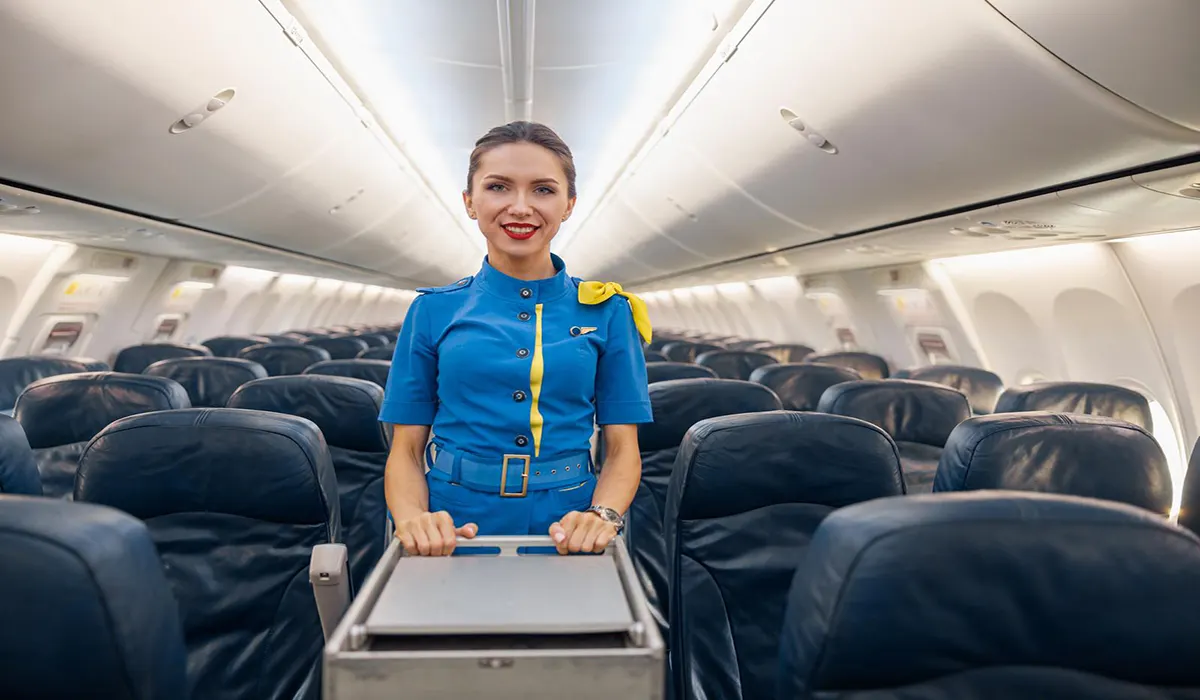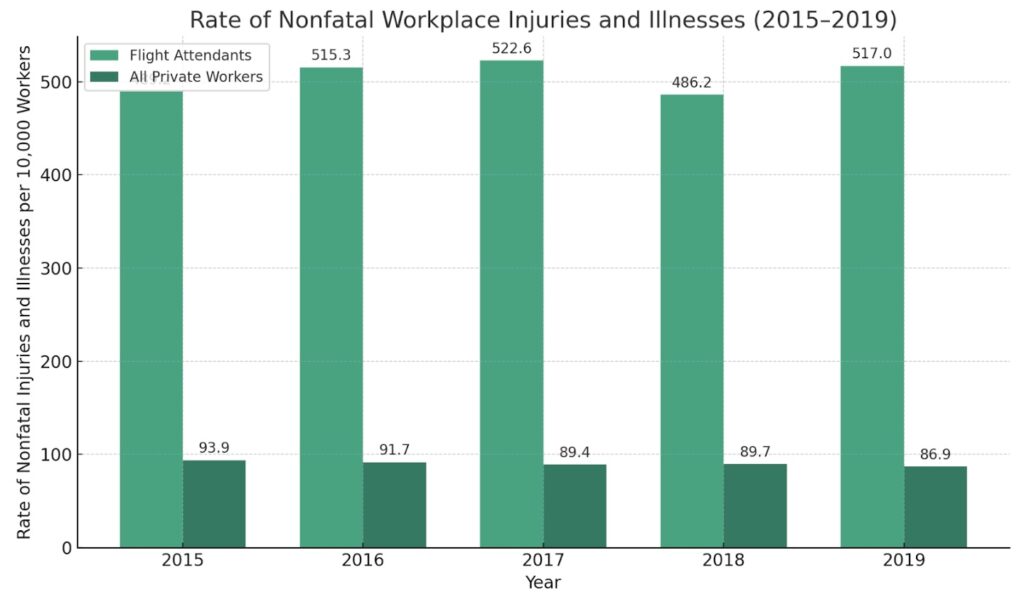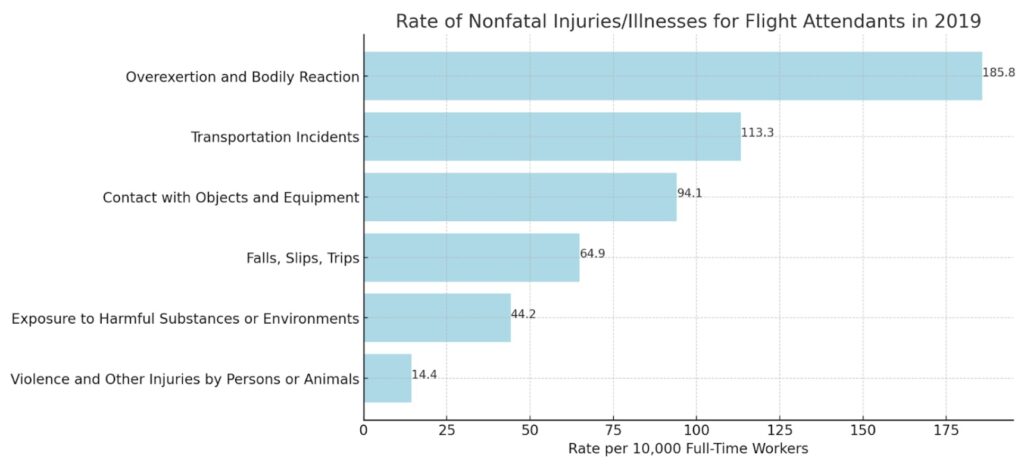
Workers’ Compensation for Injured Airline Workers in SC
Understand how workers’ comp can help you recover medically and financially after a job-related injury, illness or disease in Columbia
The airline industry in South Carolina is a significant contributor to the state’s economy, boasting an impressive annual economic activity of $16.3 billion and employing over 122,000 workers, as reported by the South Carolina Aeronautics Commission in 2018.
This thriving sector, vital to both transportation and commerce, encompasses a wide range of roles, from pilots and flight attendants to ground staff and maintenance crews. However, with the dynamic and physically demanding nature of these jobs, there’s an inherent risk of work-related injuries.
For those working in the airline industry, it’s crucial to know that if you’re injured on the job, you may be entitled to workers’ compensation benefits. These benefits are designed to provide support and financial assistance, ensuring that you can focus on recovery and return to your role in this vital sector of South Carolina’s economy.
In this article, we’ll discuss your eligibility for workers’ comp benefits and guide you through the process of filing a claim and maximizing your compensation.
If you have further questions or would like assistance with your claim, reach out to our knowledgeable Columbia work injury attorneys to schedule your free consultation.
Is it dangerous to be a flight attendant?
The short answer is yes. According to the U.S. Bureau of Labor Statistics (BLS), in 2019 alone, flight attendants suffered 4,980 nonfatal workplace injuries and illnesses requiring days off work. That’s a rate of 517 per 10,000 full-time workers. By comparison, the rate across all private industries was only 86.9.
This means that the injury rate among flight attendants was nearly 6 times higher than the private industry average that year.
These numbers are largely consistent with rates in previous years, as seen in the chart below.

What is the most common injury in the airline industry?
In the airline industry, the most common type of injury is overexertion. These injuries typically occur due to the physical demands of the job, which can include handling luggage, pushing service carts, and assisting passengers. Common overexertion injuries include muscle strains, back injuries, joint pain, and other musculoskeletal disorders.
Other common injuries for airline workers include:
- Cuts and lacerations. These can occur due to handling sharp objects or equipment during baggage handling or maintenance activities.
- Hearing loss. Hearing loss is an occupational disease caused by prolonged exposure to high noise levels, particularly affecting ground crew and maintenance staff.
- Burns. Occurring in aircraft galleys or during maintenance operations, these injuries can vary in severity.
- Respiratory issues. Chronic lung issues and diseases can be caused by exposure to harmful substances or environments, like fuel fumes or chemicals.
- Traumatic injuries. Often a result of slip-and-fall accidents or violence, injuries like fractures, spinal cord injuries and traumatic brain injuries can occur in aircraft cabins, on tarmacs or within airport facilities.
Occupational Diseases in the Workplace
Learn how to prove an occupational disease or illness like hearing loss or carpal tunnel syndrome was caused by your job so you can get the compensation you deserve.
How do most airline worker injuries occur?
While the BLS reports that the most common cause of injuries among airline workers is overexertion and bodily reaction due to activities like lifting heavy objects and repetitive tasks, other incidents that frequently lead to airline worker injuries include transportation accidents, contact with sharp or heavy equipment, slip-and-fall accidents, toxic substances, and violence.

Are airline workers entitled to workers’ compensation in South Carolina?
Yes, airline workers in South Carolina are generally entitled to workers’ compensation benefits if they suffer job-related injuries, illnesses or diseases. South Carolina law mandates that most employers with 4 or more employees, including airlines, provide workers’ compensation insurance for their employees. However, you must be an employee and not an independent contractor to qualify.
This coverage ensures that airline employees receive medical treatment and compensation for lost wages, regardless of who’s at fault for the work-related injury or health condition.
In most cases, the no-fault nature of workers’ compensation means that benefits can be provided even if the injury was the fault of the employee, making it a crucial safety net for workers in the airline industry.
What if I’m a federal employee who is employed by the FAA?
If you’re a federal employee employed by the Federal Aviation Administration (FAA), your workers’ compensation coverage is handled differently than for private sector or state employees. Federal employees, including those working for the FAA, are covered under the Federal Employees’ Compensation Act (FECA), which is administered by the Office of Workers’ Compensation Programs (OWCP) instead of through a state workers’ compensation program, although the benefits for injured workers are similar.
Are airlines liable for turbulence injuries?
Yes, an employer’s workers’ compensation typically covers injuries sustained by an airline worker due to turbulence as long as the injuries occur in the course of employment. The key factor for workers’ compensation coverage is that the injury must arise out of and in the course of employment.
For airline workers, if they’re performing their job duties when turbulence and resulting injuries occur, this condition is generally met. This includes situations where flight attendants might be walking through the cabin, assisting passengers, or performing other duties when turbulence hits.
Does workers’ comp cover workplace violence from a passenger?
Yes, workers’ compensation in South Carolina typically covers injuries caused by a passenger’s violence if the incident occurred while the airline worker was performing their job duties. In the context of airline work, injuries resulting from dealing with unruly passengers or violent incidents on board are considered work-related hazards, so they should be covered as long as the worker didn’t initiate the physical confrontation.
What benefits are injured airline employees entitled to under workers’ comp?
Injured airline employees are entitled to several key benefits under workers’ compensation, which are designed to assist them during their recovery and return to work. These benefits typically include:
- Medical benefits. These cover all necessary medical treatments related to the work injury, including hospital visits, surgeries, medications, mileage reimbursement for medical treatment, and rehabilitation services.
- Wage replacement benefits. This is compensation for lost wages if the employee is unable to work due to their injury. This usually amounts to two-thirds of the employee’s average weekly wage and continues until they can return to work or reach what’s called maximum medical improvement (MMI).
- Vocational rehabilitation. If the injury prevents the employee from returning to their previous job, they may be eligible for vocational rehabilitation services to help them find alternative employment or adjust to new job responsibilities.
- Death benefits. In the event of a fatality, the worker’s dependents may receive death benefits, including a portion of the worker’s wages and coverage for funeral expenses.
These benefits aim to ensure that injured airline employees receive the necessary support and financial assistance to help them recover and return to work or otherwise adjust to life after a serious injury.
What steps do injured airline workers need to take to file a workers’ compensation claim in SC?
Injured airline employees in South Carolina need to follow specific steps to file a workers’ compensation claim effectively. Failure to take these steps could result in a denied claim:
- Report the injury. Whenever possible, you should immediately inform your employer about any accident or injury. South Carolina law requires that this be done within 90 days of the injury, but it’s best to report it as soon as possible for timely processing.
- Seek medical attention. Get medical treatment for your injury to prevent it from getting worse and to obtain documentation linking your injury to your job. For emergency care, go to the nearest health care provider. For non-emergency situations, check with your employer to see if there’s a designated medical provider for workers’ compensation cases.
- File a claim. Your employer should report the injury to their workers’ compensation insurance carrier and file a claim with the South Carolina Workers’ Compensation Commission to begin the claims process. If your employer does not report the injury or if there are issues with the process, you should file your own claim by submitting Form 50 to the Commission.
- Seek legal advice. If you encounter difficulties or complexities with your claim or would simply like an estimate of how much your claim should be worth, consult a workers’ compensation attorney for guidance and representation.
Additionally, be sure to adhere to the medical advice and treatment plan provided by your health care provider. Non-compliance can negatively impact your workers’ compensation claim.
Why Did It Take So Long for Me To Get Work Comp Benefits?
Legal insights on what you need to know to expedite your claim.
Can I lose my job due to an injury?
In South Carolina, as in many states, employment is generally “at-will,” which means an employer can terminate an employee for any reason, except for illegal reasons such as discrimination or retaliation. However, there are specific protections in place for workers who have filed for or are receiving workers’ compensation benefits.
Legally, an employer cannot fire an employee solely because they have filed a workers’ compensation claim. Such an action could be considered retaliatory and could give rise to legal claims against the employer.
That said, filing a workers’ compensation claim does not entirely shield an employee from being laid off or terminated for legitimate business reasons unrelated to the claim, such as company downsizing or performance issues.
If you’re injured and unable to perform your job duties for an extended period, an employer may be able to legally replace you, depending on the circumstances. However, if your injury leads to a disability, you may be protected under the Americans with Disabilities Act (ADA) and similar state laws, which require employers to provide reasonable accommodations for disabled employees.
In any case, it’s advisable to consult with a workers’ compensation attorney to understand your rights and protections in the context of your specific situation.
Looking for the best work injury attorney in Columbia? Find out how Smith, Born, Leventis, Taylor & Vega can maximize your claim.
If you’re an injured airline worker trying to navigate the complexities of a workers’ compensation claim in Columbia, know that you don’t have to face this challenge alone. At Smith, Born, Leventis, Taylor & Vega, we understand the intricacies of workers’ compensation laws and the unique challenges you face in the airline industry.
Our experienced Columbia work injury attorneys are dedicated to ensuring that you receive the full benefits and compensation you are entitled to. We’re here to guide you through every step of the claim process, from filing the initial paperwork to handling any disputes that may arise.
We recognize the physical and emotional toll a work-related injury can take, and our goal is to alleviate the burden of the legal process, allowing you to focus on your recovery.
Contact us today and schedule a free consultation to find out how we can help you secure the compensation you deserve and get you back on the path to recovery.
References
Nonfatal workplace injuries and illnesses for flight attendants in 2019 : The Economics Daily: U.S. Bureau of Labor Statistics. (n.d.). www.bls.gov. https://www.bls.gov/opub/ted/2021/nonfatal-workplace-injuries-and-illnesses-for-flight-attendants-in-2019.htm
South Carolina Statewide Aviation System Plan Economic Impact Study Report – 2018. (n.d.). https://scaeronautics.sc.gov/systemplan/images/EconomicImpactRptsPdf%5CEIR_LUX.pdf


